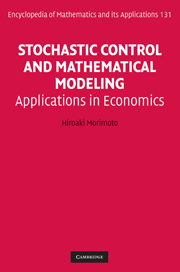Book contents
- Frontmatter
- Contents
- Preface
- Part I Stochastic Calculus and Optimal Control Theory
- Part II Applications to Mathematical Models in Economics
- 6 Production Planning and Inventory
- 7 Optimal Consumption/Investment Models
- 8 Optimal Exploitation of Renewable Resources
- 9 Optimal Consumption Models in Economic Growth
- 10 Optimal Pollution Control with Long-Run Average Criteria
- 11 Optimal Stopping Problems
- 12 Investment and Exit Decisions
- Part III Appendices
- Bibliography
- Index
9 - Optimal Consumption Models in Economic Growth
from Part II - Applications to Mathematical Models in Economics
Published online by Cambridge University Press: 07 September 2011
- Frontmatter
- Contents
- Preface
- Part I Stochastic Calculus and Optimal Control Theory
- Part II Applications to Mathematical Models in Economics
- 6 Production Planning and Inventory
- 7 Optimal Consumption/Investment Models
- 8 Optimal Exploitation of Renewable Resources
- 9 Optimal Consumption Models in Economic Growth
- 10 Optimal Pollution Control with Long-Run Average Criteria
- 11 Optimal Stopping Problems
- 12 Investment and Exit Decisions
- Part III Appendices
- Bibliography
- Index
Summary
We study the optimal consumption problem in the neoclassical theory of capital accumulation and economic growth under uncertainty. We consider two factor markets – one for labor and one for capital services.
There are many identical households, each with a utility function given by U(c) for consumption c. Households supply the uncertain amount of labor Y(t). There are many identical firms, each with the same technology for production. Firms rent the services of capital and labor to produce output. The increase of the capital stock X(t) coincides with the totality of the production F(X(t), Y(t)) net of the consumption c(t) and the depreciation λX(t) with rate λ until the capital stock vanishes. The decision that the household has to make is how much to consume or how to maximize the expected discounted utility of consumption with a utility function U(c).
We show the existence of a classical solution of the HJB equation (9.6) associated with the stochastic optimization problem, and then give an optimal consumption policy in terms of its solution.
The Model
Consider the neoclassical growth model of the Solow-type under uncertainty, in Merton [113]. Define the following quantities:
Y(t) = labor supply at time t.
X(t) = capital stock at time t.
F(x, y) = constant-returns-to-scale production function producing the commodity for the capital stock x ≥ 0 and the labor force y > 0.
[…]
- Type
- Chapter
- Information
- Stochastic Control and Mathematical ModelingApplications in Economics, pp. 217 - 236Publisher: Cambridge University PressPrint publication year: 2010



